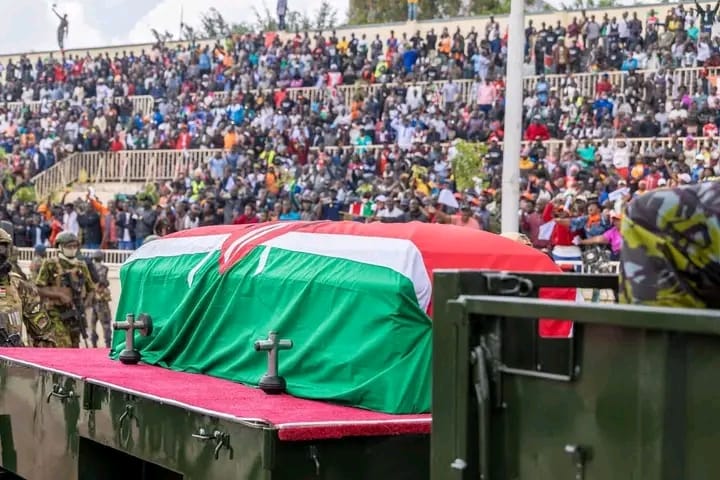State Funerals in Kenya: Understanding the Honour and Who Qualifies.

Nairobi, Kenya – A state funeral in Kenya is the highest ceremonial honour the government can bestow upon a citizen — a solemn national farewell reserved for individuals who have made extraordinary contributions to the nation. From founding presidents to global icons and respected leaders, the gesture embodies national unity, remembrance, and collective mourning. Yet, despite its deep symbolism, the question of who qualifies for such a farewell remains rooted in custom rather than clear law.
What Is a State Funeral?
A state funeral is a publicly funded, government-organised ceremony that celebrates and honours the life of a person deemed to have had a significant impact on the country. The event involves elaborate military and state protocols, including a formal procession, lying in state, flag-draped coffins, military salutes, and nationwide mourning.
According to The Standard, the ceremony represents “a country’s final salute to a hero or national figure,” providing a moment for citizens to pay their respects collectively. The national flag is flown at half-mast, and senior state officials — including the President, Cabinet, Parliament, Judiciary, and foreign dignitaries — typically attend.
The Historical Context
Kenya’s first state funeral was held in 1978 for the country’s founding father, Mzee Jomo Kenyatta, who died while in office. The ceremony, rich in military tradition and national symbolism, set the tone for how Kenya would honour its most revered figures in the years that followed.
Since then, only a few individuals outside the presidency have received the honour. These include Nobel Peace Prize laureate Prof. Wangari Maathai, former Vice President Michael Kijana Wamalwa, and former First Lady Lucy Kibaki. Each of their ceremonies reflected unique elements of Kenya’s cultural and political diversity, yet all shared one defining trait — national significance.
Who Qualifies for a State Funeral?
Despite its prominence, Kenya has no legislation or constitutional clause that formally defines the criteria for a state funeral. Instead, the decision rests primarily with the sitting President, often in consultation with the National Defence Council and the Cabinet.
According to Citizen Digital, the following individuals are automatically or typically considered for the honour:
Sitting or former Heads of State and Government.
Chiefs of Defence Forces or other senior military officials.
National figures who have brought global recognition or contributed immensely to national development, unity, or culture.
For civilians, the decision is discretionary. “The President may, in consultation with the Defence Council, accord the honour to a distinguished citizen whose life’s work had a profound national impact,”
Ceremonial Features and Traditions
State funerals in Kenya are marked by formal procedures and symbolic gestures. The body often lies in state at Parliament Buildings or a designated public venue to allow citizens to pay their respects. Military honours — including a 21-gun salute, pallbearers from the armed forces, and the national flag draped over the coffin — underscore the solemnity of the event.
During the mourning period, the national flag is flown at half-mast across government installations. The final service is usually led by religious leaders representing various faiths, symbolising Kenya’s unity in diversity.
In some cases, as witnessed during the funerals of Kenyatta, Wamalwa, and Maathai, the government covers all logistical costs, security, and media coordination, treating the ceremony as a national event rather than a private family affair.
The Debate: Law or Custom?
A 2020 academic paper titled State Funerals in Kenya 1963–2020: The Need to Constitutionalize highlights inconsistencies in how these honours are granted. Author Tinega Charles Intabo argues that Kenya should develop a legal framework to clarify eligibility, funding, and the roles of state institutions in organising such events.
“The practice has been inconsistent, relying more on presidential discretion than institutional policy,” the paper notes. Without formal regulation, questions persist over whether figures from civil society, sports, academia, or the arts who have represented Kenya internationally should also qualify.
Recent Example and Public Reflection
The ongoing national mourning for the late Raila Amollo Odinga, Kenya’s long-serving opposition leader and former Prime Minister, has reignited debate over the process. His state funeral arrangements have drawn thousands across the nation, reflecting both his political influence and the public’s desire to celebrate his lifelong contribution to democracy.
Crowds thronged Kasarani Stadium and later Bondo, Siaya County, to pay their final respects — a testament to his enduring connection with ordinary Kenyans. The ceremony’s scale and emotion reaffirmed how state funerals serve not only as official honours but also as national moments of collective identity.
The Way Forward
As Kenya continues to mature democratically, many voices are calling for codification of the state funeral process. Clear guidelines would ensure fairness, transparency, and consistency in recognising those who have shaped the nation’s history.
Until such a law is enacted, state funerals will remain largely symbolic, resting on the President’s prerogative and national sentiment — a profound yet fluid reflection of how Kenya honours its greatest sons and daughters.

